The remote work landscape is more competitive than ever. While skills and experience are crucial, a strategic certification can be the differentiator that gets your resume noticed by hiring managers. But with thousands of options available across platforms like Coursera, Udemy, and Google, how do you choose the ones that truly matter to remote-first employers? This guide cuts through the noise. We will analyze the best certifications for remote jobs, breaking down not just what they are, but how they translate into tangible career opportunities in fields from project management to cybersecurity.
For those targeting remote roles in information security, mastering how to achieve highly respected credentials like ISO 27001 certification can be a significant career accelerator.
This comprehensive listicle is designed to be your roadmap. For each of the top 12 certifications, we provide a detailed analysis covering:
- Issuing authority and industry recognition
- Total cost and time commitment
- Practical skills you will gain
- Actionable tips for leveraging it in your job search
We’ve included direct links and screenshots for each platform to help you navigate your options efficiently. Whether you’re transitioning into a remote career or aiming for a promotion, this is your resource for getting certified and hired.
1. Coursera
Coursera stands out as a premier online learning platform, offering a vast catalog of courses, professional certificates, and even full degrees from world-renowned universities and industry leaders like Google, IBM, and Meta. For those seeking the best certifications for remote jobs, Coursera provides unparalleled access to high-quality, credentialed education that can be completed entirely online, fitting flexibly around any schedule. Its curriculum is particularly strong in high-demand remote fields such as data science, software development, digital marketing, and project management.

The platform’s strength lies in its structured learning paths. Many professional certificate programs are designed specifically for entry-level roles, requiring no prior experience and offering hands-on projects to build a job-ready portfolio. This practical application is crucial for demonstrating skills to remote employers.
Key Details & User Experience
Coursera’s user interface is clean and intuitive, with a dashboard that makes tracking progress across multiple courses simple. The blend of video lectures, readings, and peer-graded assignments creates an engaging learning environment.
- Cost: While you can audit many courses for free, earning a certificate requires payment. Subscriptions like Coursera Plus ($59/month) offer unlimited access, while individual specializations typically cost between $39-$79 per month. Financial aid is also available.
- Time Commitment: Varies widely, from a few hours for a single course to several months for a comprehensive Professional Certificate.
- Pros: Access to elite institutions, robust career-focused programs, and financial aid options.
- Cons: Certificate costs can accumulate, and some advanced courses have steep learning curves.
Website: https://www.coursera.org
2. Udemy
Udemy is a massive open online course provider known for its enormous and diverse library of individual courses. It empowers independent experts to create and sell their training, making it an excellent resource for acquiring specific, practical skills. While it may not offer university-accredited programs, Udemy excels at providing targeted training in areas crucial for remote work, such as web development, graphic design, and digital marketing, making it a go-to for skill-specific certifications for remote jobs.
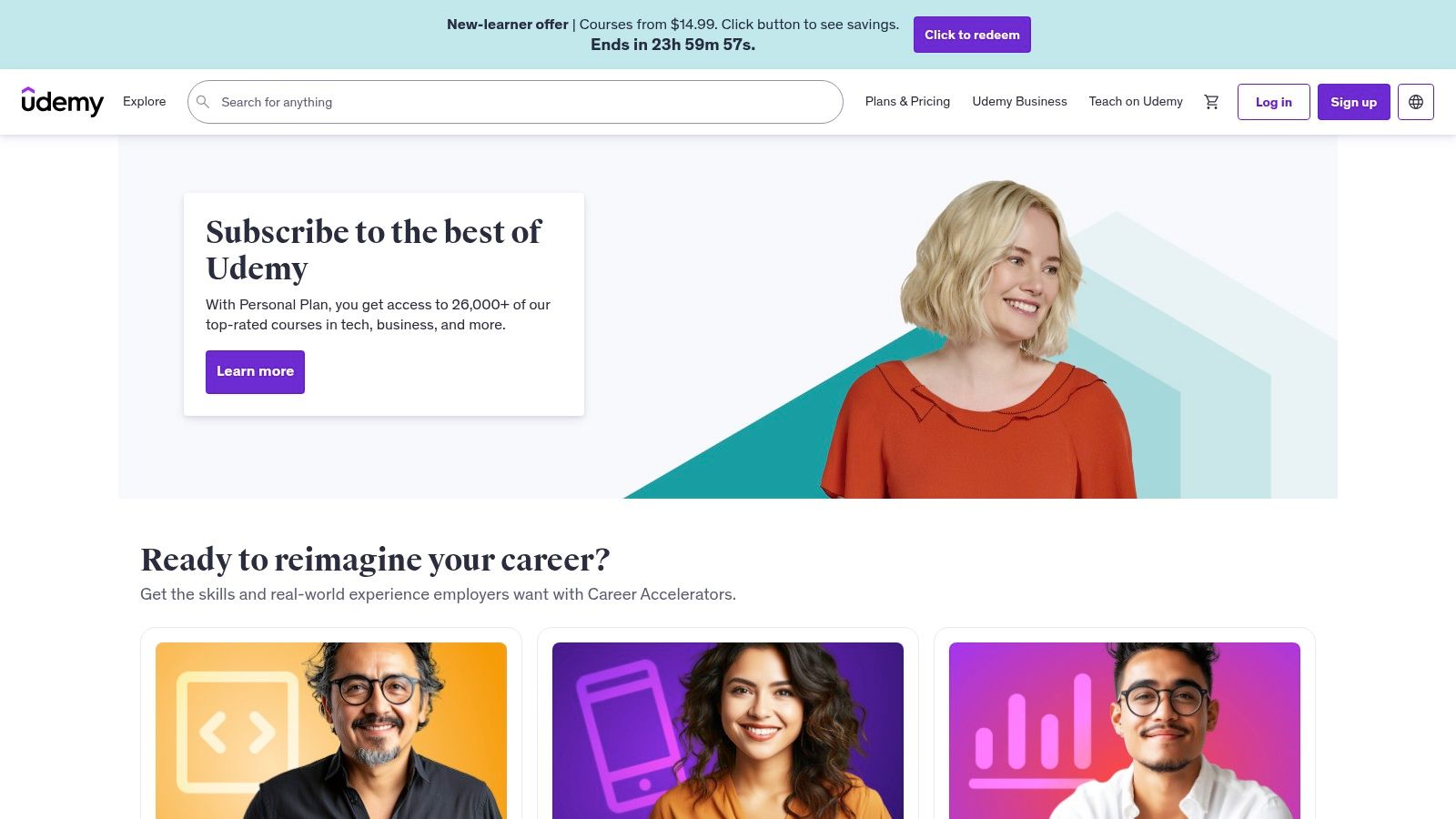
The platform’s key differentiator is its a la carte, lifetime access model. You buy a course once and own it forever, allowing you to learn at your own pace and revisit material as needed. This flexibility is perfect for remote professionals looking to upskill quickly or learn a new tool without a lengthy commitment.
Key Details & User Experience
Udemy’s interface is straightforward, focusing on the course content itself, with video players, downloadable resources, and Q&A sections. The user review and rating system is essential for navigating the vast catalog and identifying high-quality courses.
- Cost: Courses are individually priced, often ranging from $19.99 to $199.99. However, Udemy is famous for frequent, deep-discount sales where most courses are available for $10-$20.
- Time Commitment: Highly variable, from one-hour crash courses to 50+ hour masterclasses.
- Pros: Extremely affordable with sales, massive course variety, and lifetime access to purchased content.
- Cons: Quality can be inconsistent, and certificates of completion hold less weight than accredited credentials.
Website: https://www.udemy.com
3. LinkedIn Learning
LinkedIn Learning leverages the world’s largest professional network to offer a highly integrated learning experience. Its vast library of on-demand courses, taught by industry experts, focuses squarely on the business, technology, and creative skills that are essential for today’s remote workforce. For those seeking the best certifications for remote jobs, its key advantage is the seamless ability to add completed certificates directly to your LinkedIn profile, immediately showcasing new competencies to recruiters and your professional network.

The platform excels at providing targeted, bite-sized learning paths that can be completed on the go via its mobile app. Personalized recommendations based on your job title and skills help you discover relevant courses, making it a powerful tool for continuous professional development and upskilling in a remote-first world.
Key Details & User Experience
The user interface is clean, professional, and tightly integrated with the main LinkedIn platform, making for a familiar experience. Courses are well-produced, and the dashboard clearly tracks your learning history and progress.
- Cost: Access is subscription-based, typically around $29.99/month or $19.99/month with an annual plan. A one-month free trial is available. Many LinkedIn Premium subscriptions include access.
- Time Commitment: Courses range from under an hour to comprehensive learning paths that take 15+ hours.
- Pros: Seamless integration with LinkedIn profiles, high-quality expert-led content, and a generous one-month free trial.
- Cons: Requires a recurring subscription, and instructor interaction is generally limited compared to cohort-based platforms.
Website: https://www.linkedin.com/learning
4. edX
Founded by Harvard and MIT, edX is a nonprofit online learning destination that provides access to university-level courses from some of the world’s most prestigious institutions. For individuals pursuing the best certifications for remote jobs, edX offers a rigorous, academically-focused alternative. Its catalog is rich with in-demand subjects like computer science, data analysis, and engineering, presented with the depth and quality expected from top-tier universities, making its credentials highly respected by employers.
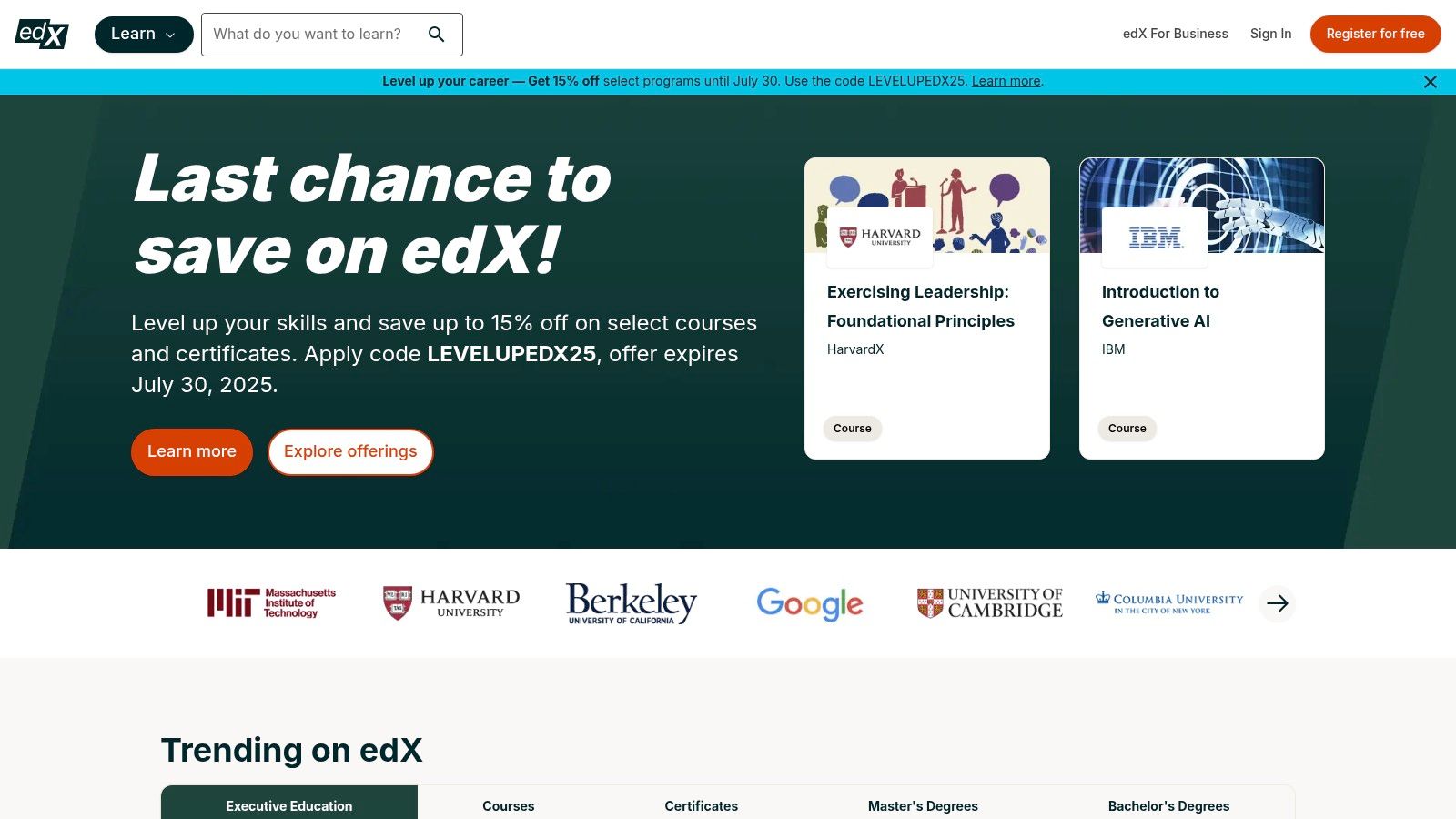
The platform’s major differentiator is its direct link to higher education. It features comprehensive Professional Certificate programs and stackable MicroMasters programs, which can count as credit toward a full master’s degree. This pathway provides a significant advantage for those looking to build a long-term career foundation while securing a remote role.
Key Details & User Experience
The edX platform feels academic and structured, mirroring a university online portal. Navigation is straightforward, and courses are well-organized with clear syllabi and learning objectives.
- Cost: Many courses can be audited for free. To earn a verified certificate, prices vary significantly, from around $50 to several hundred dollars. Professional Certificate and MicroMasters programs can cost over $1,000. Financial assistance is available for eligible learners.
- Time Commitment: Ranges from a few weeks for a single course to over a year for a multi-course MicroMasters program.
- Pros: High-quality academic content from elite universities, flexible learning options, and financial assistance.
- Cons: Some programs can be expensive, and course availability may be limited in less academic subjects.
Website: https://www.edx.org
5. Google Career Certificates
Google has made a significant impact on the online learning space with its Google Career Certificates, designed to provide job-ready skills in high-growth, remote-friendly fields. These programs are built by Google experts and are aimed at individuals seeking to enter fields like IT Support, Data Analytics, Project Management, and UX Design without a traditional degree. Their focus on practical, in-demand skills makes them one of the best certifications for remote jobs, as they are highly recognized by employers.
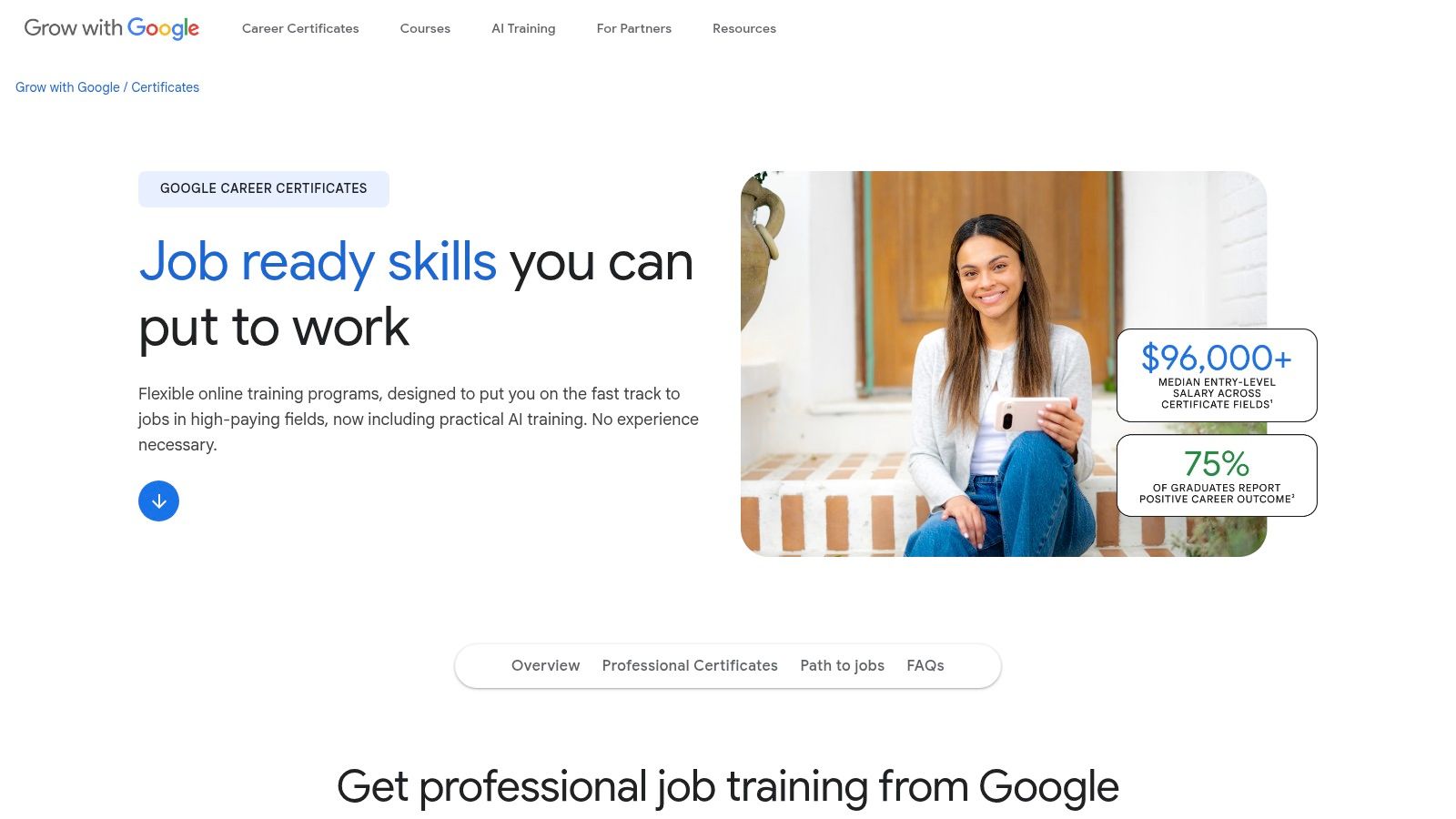
The primary advantage of these certificates is their direct connection to the industry. Google has a consortium of over 150 companies that consider graduates for open roles. The curriculum is delivered through Coursera and emphasizes hands-on projects, allowing you to build a portfolio that showcases your abilities to potential remote employers.
Key Details & User Experience
The learning experience is structured and self-paced, using a mix of videos, labs, and assessments. The platform is user-friendly, and the content is broken down into manageable weekly modules, making it easy to fit into a busy schedule.
- Cost: The certificates are offered via Coursera for a monthly subscription of around $49. At the recommended pace, most can be completed for under $300. Financial assistance is available.
- Time Commitment: Designed to be completed in under six months, studying part-time (less than 10 hours a week).
- Pros: Highly affordable, strong employer recognition, and access to an exclusive job board and career resources upon completion.
- Cons: Content is hyper-focused on specific roles and may not be as academically deep as university programs; not a formally accredited credential.
Website: https://grow.google/certificates/
6. HubSpot Academy
HubSpot Academy is an invaluable free resource, particularly for those targeting remote roles in digital marketing, sales, and customer service. It offers a wide range of globally recognized certifications that teach the principles of inbound methodology, a customer-centric approach highly valued by modern, remote-first companies. Because the courses are developed by an industry leader in marketing automation, the certifications carry significant weight and demonstrate practical, up-to-date knowledge. These credentials are among the best certifications for remote jobs in the marketing sector, as they validate skills in content strategy, SEO, and email marketing.
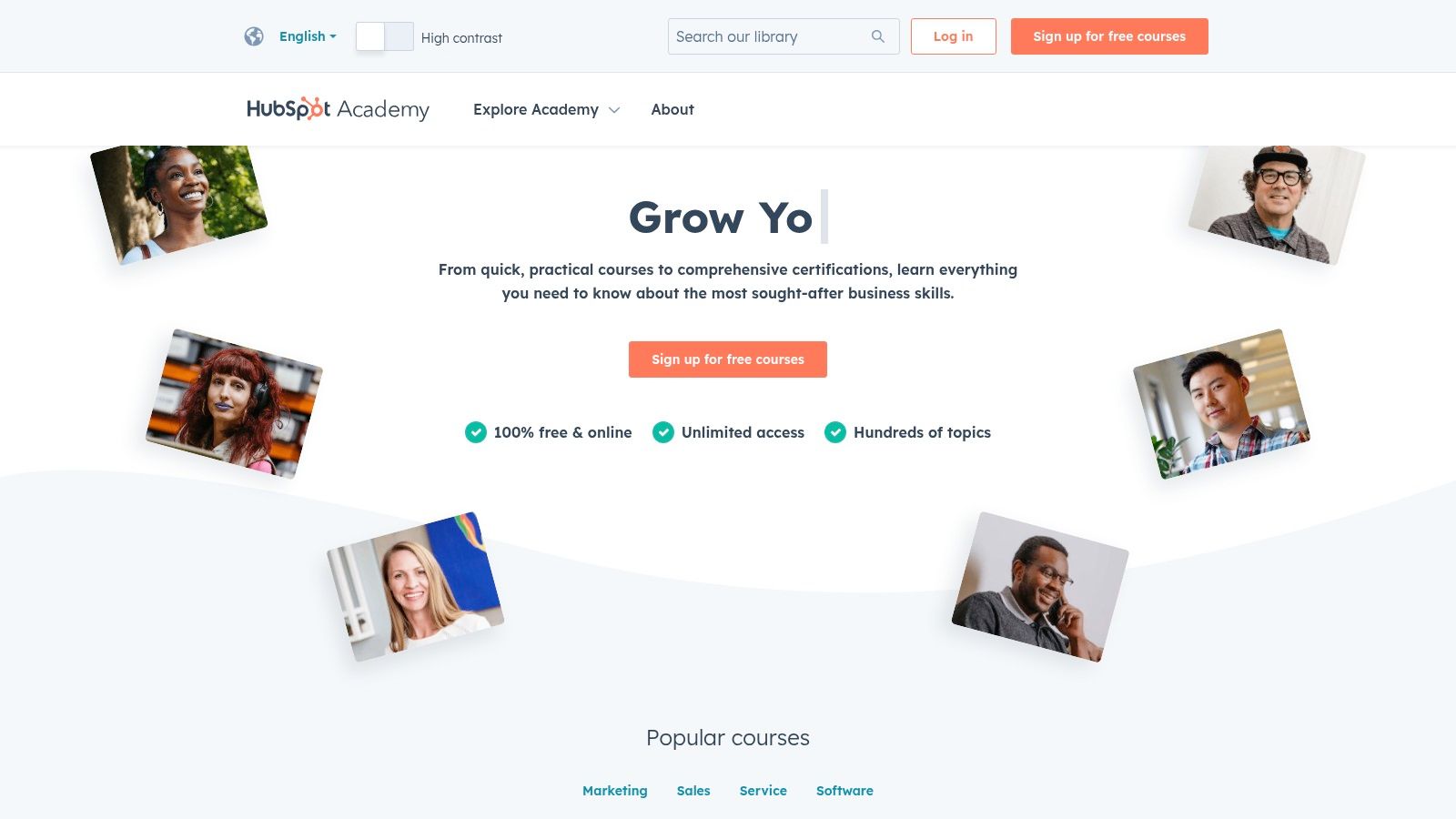
The platform excels at breaking down complex topics into digestible, actionable lessons. The focus is less on abstract theory and more on real-world application, equipping learners with skills they can use immediately in a remote marketing or sales position. This makes it an ideal starting point for career changers or professionals looking to upskill quickly.
Key Details & User Experience
HubSpot Academy’s platform is straightforward and user-friendly, with a simple dashboard to track your learning paths and certifications. The content consists of high-quality video lessons taught by industry experts, supplemented by quizzes and practical exercises.
- Cost: Completely free. All courses, materials, and certification exams are available at no cost.
- Time Commitment: Most certifications can be completed within a few hours to a day, making it easy to learn and get certified quickly.
- Pros: Entirely free access to high-quality training, certificates are well-recognized in the industry, and the content is practical and career-focused.
- Cons: Course selection is limited to marketing, sales, and service-related topics; programs are less comprehensive than paid, in-depth specializations.
Website: https://academy.hubspot.com
7. Scrum Alliance
Scrum Alliance is a foundational organization for professionals seeking to master Agile and Scrum frameworks, which are essential in today’s fast-paced, collaborative remote work environments. It offers globally recognized credentials like the Certified ScrumMaster (CSM) and Certified Scrum Product Owner (CSPO). For those looking for the best certifications for remote jobs in tech, software development, or project management, a Scrum Alliance certification validates your ability to lead and contribute to agile teams, a highly sought-after skill for remote-first companies.
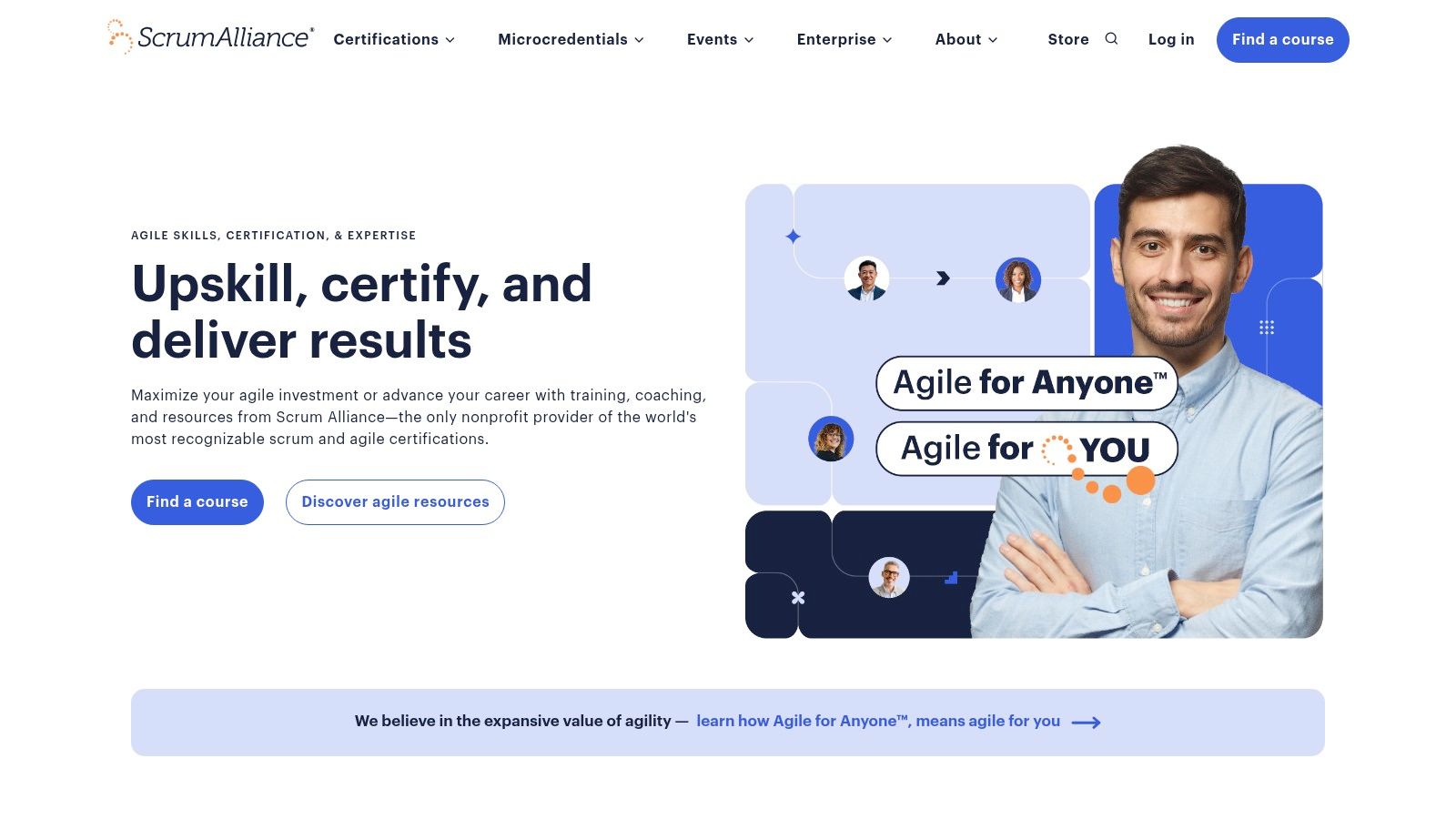
The platform’s unique strength lies in its mandatory two-day training courses led by Certified Scrum Trainers (CSTs). This ensures a high-quality, interactive learning experience that goes beyond rote memorization, focusing on the core principles and practical application of the Scrum framework. This hands-on approach is invaluable for demonstrating real-world readiness to employers.
Key Details & User Experience
Navigating the Scrum Alliance website is straightforward, allowing users to easily find certified trainers and courses by location or virtual format. The emphasis is less on a digital platform and more on connecting you with accredited, in-person or live-online training events.
- Cost: Varies significantly by trainer and location, but expect to pay between $400 and $2,000 for a certification course. Renewal is required every two years with a $100 fee and continuing education credits.
- Time Commitment: Most foundational certifications, like the CSM, require completion of a mandatory 14-16 hour course, typically held over two days.
- Pros: Globally recognized credential, enhances project management skills for Agile environments, and provides access to a large professional community.
- Cons: Certification courses are a significant financial investment, and the bi-annual renewal requirement adds an ongoing cost.
Website: https://www.scrumalliance.org
8. CompTIA
CompTIA is a cornerstone in the IT industry, offering globally recognized, vendor-neutral certifications that form the bedrock of many technical careers. For those seeking the best certifications for remote jobs in IT support, networking, and cybersecurity, CompTIA credentials like A+, Network+, and Security+ are often considered essential prerequisites by employers. These certifications validate foundational skills, proving to remote hiring managers that you have the core knowledge to handle technical responsibilities independently.

The platform’s strength lies in its standardized, respected curriculum that is regularly updated to reflect current industry demands. Earning a CompTIA certification demonstrates a commitment to professional standards and provides a clear pathway for career progression into more specialized and higher-paying remote roles. Given the increasing importance of data protection in distributed work environments, a CompTIA Security+ certification is particularly valuable. You can explore a deeper dive into cybersecurity for remote workers to understand its relevance.
Key Details & User Experience
CompTIA provides extensive learning resources, training partners, and study guides to help candidates prepare. The exams themselves are proctored, which lends credibility to the certification earned, whether taken online or at a testing center.
- Cost: Exam voucher costs vary, ranging from approximately $250 to over $400 per exam. Official training materials and courses are an additional expense.
- Time Commitment: Preparation can take anywhere from a few weeks to several months, depending on your prior experience and study habits.
- Pros: Highly respected and frequently requested by employers, provides a solid IT foundation, and vendor-neutral skills are broadly applicable.
- Cons: Exam fees can be expensive, and self-study requires significant discipline and often additional investment in materials.
Website: https://www.comptia.org
9. AWS Training and Certification
Amazon Web Services (AWS) offers a robust suite of certifications that are among the most respected credentials in the tech industry. For anyone aspiring to a remote role in cloud computing, DevOps, or solutions architecture, obtaining an AWS certification is a powerful career move. The platform provides a clear pathway, from the foundational Cloud Practitioner certification to specialized credentials in security, machine learning, and advanced networking, making it one of the best sources for certifications for remote jobs in the cloud sector.
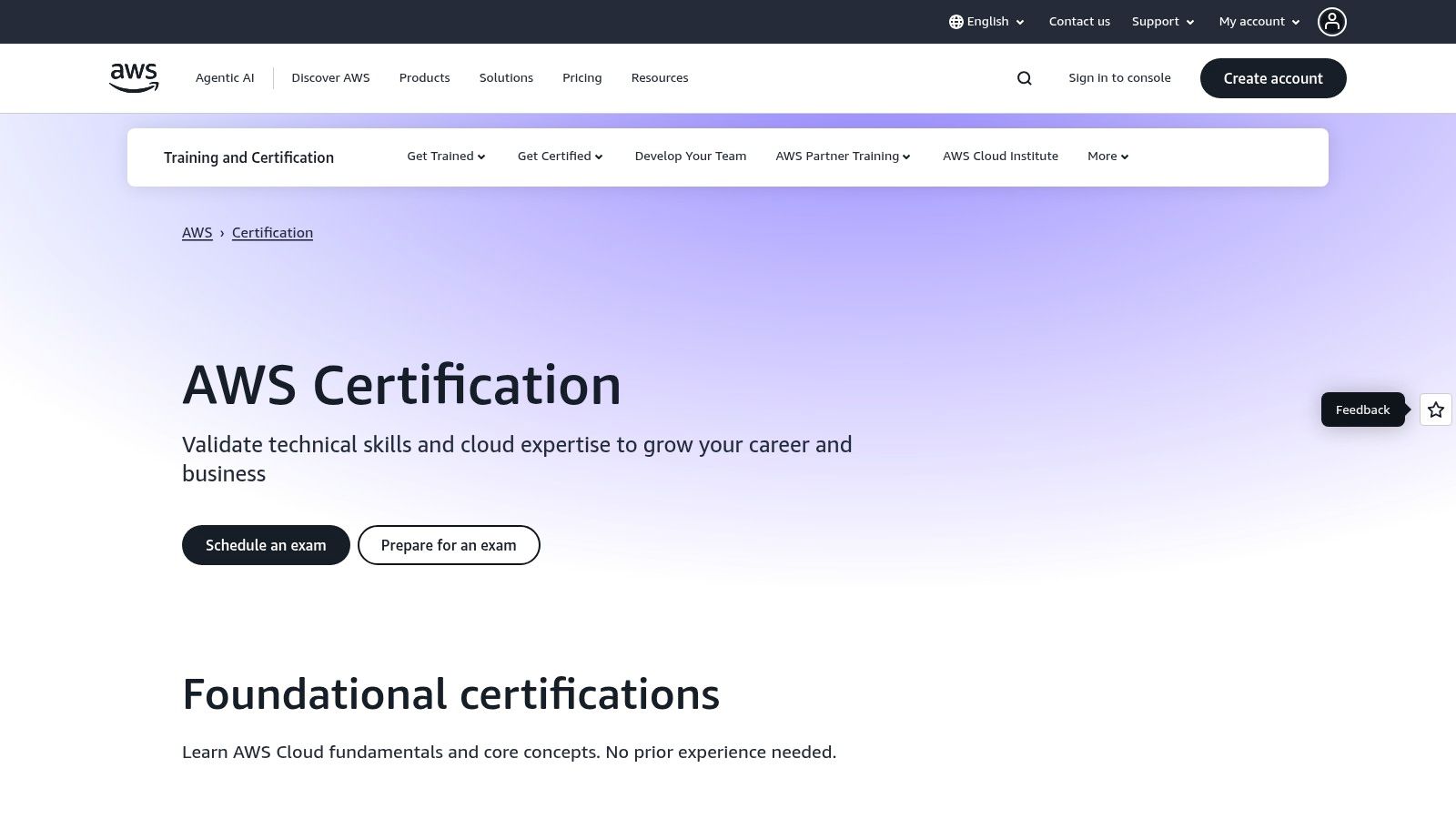
The primary strength of AWS certifications lies in their direct relevance to real-world job functions. Companies worldwide rely on AWS, and they actively seek professionals who can prove their expertise. The vast library of official training materials, practice exams, and labs provides a comprehensive ecosystem to prepare for these rigorous tests. For companies looking to build out their technical teams, hiring remote developers with AWS skills is often a top priority.
Key Details & User Experience
The AWS Training and Certification portal is functional and packed with information, guiding users toward the right learning path based on their role or desired skills. While not as sleek as some modern learning platforms, it is highly effective at organizing a massive amount of technical content.
- Cost: Exam costs range from $100 for the Foundational level to $300 for Specialty exams. Training resources vary, with many free digital courses available alongside paid, instructor-led options.
- Time Commitment: Preparation can take anywhere from a few weeks for the foundational exam to several months for professional-level certifications, depending on prior experience.
- Pros: Extremely high demand in the remote job market, globally recognized credentials, and flexible, role-based learning paths.
- Cons: Exams are known to be challenging and require deep technical knowledge, and preparation can be time-intensive.
Website: https://aws.amazon.com/certification/
10. Microsoft Learn
Microsoft Learn is an essential hub for anyone whose career relies on the Microsoft ecosystem. It offers free, hands-on, and role-based learning paths directly from the source, making it one of the best platforms for earning certifications for remote jobs in IT, cloud computing, and software development. The platform provides official preparation materials for highly recognized credentials in Azure, Microsoft 365, Dynamics 365, and the Power Platform, which are foundational technologies for countless companies operating remotely.
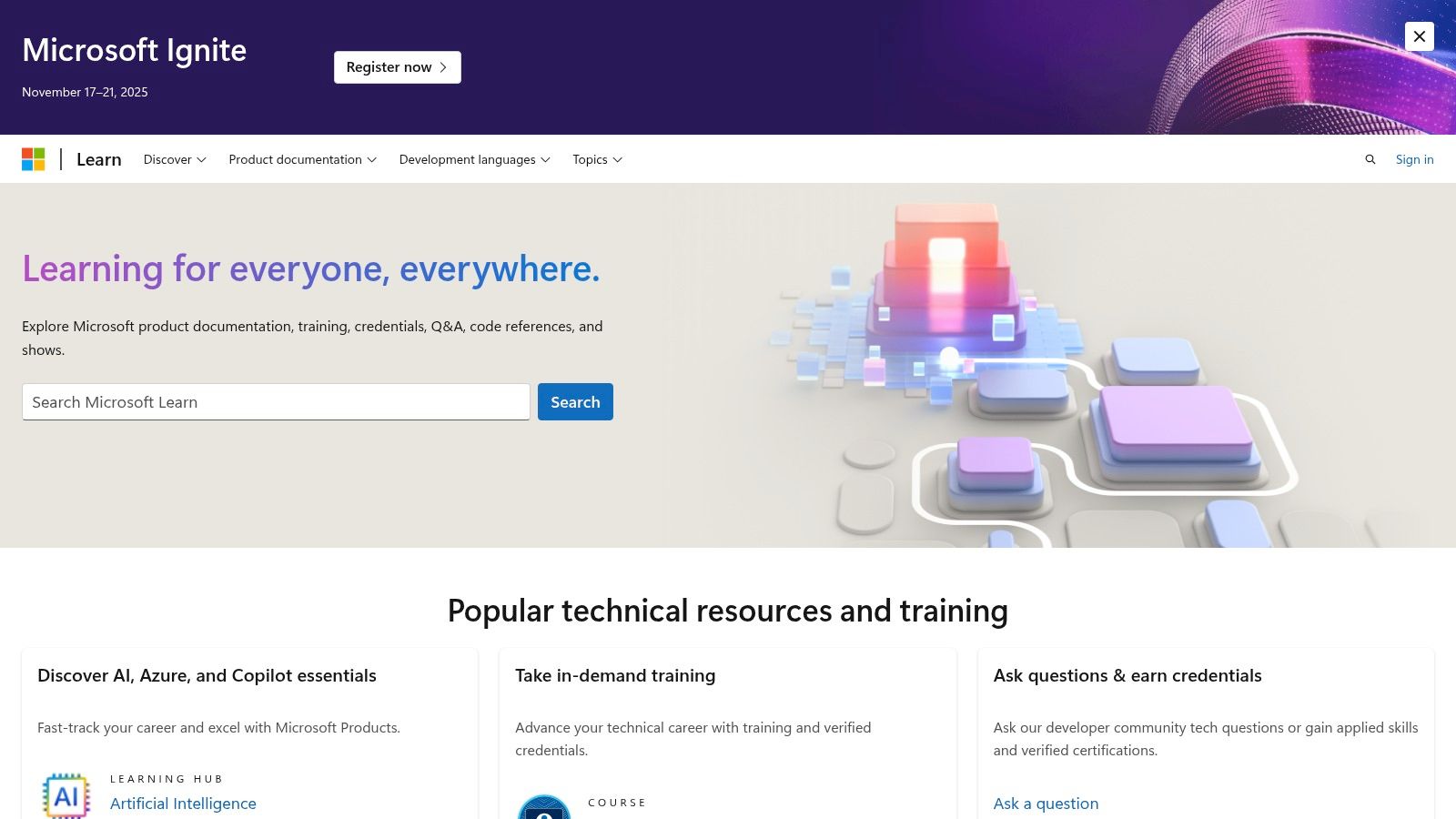
Its direct integration with Microsoft’s products allows for interactive learning modules and sandboxed environments where you can practice without risk. For those looking to specialize in cloud development, certifications like the Microsoft Certified: Azure Developer Associate (AZ-204) are highly valued for remote roles. Mastering these tools through official certification demonstrates a high level of competence that remote employers actively seek, often as a core requirement for technical positions.
Key Details & User Experience
The platform is cleanly organized by product and role, making it easy to find the exact learning path for your career goals. The user experience is seamless, guiding learners from foundational modules to complex, exam-ready topics.
- Cost: All learning paths and modules are free. You only pay for the official certification exams, which typically range from $99 to $165 per exam.
- Time Commitment: Varies from a few hours for a single module to over 100 hours of study for an expert-level certification.
- Pros: Official resources from Microsoft, widely recognized credentials, and completely free learning materials.
- Cons: Exam fees can be costly, especially for certifications requiring multiple tests, and content is exclusively focused on Microsoft products.
Website: https://learn.microsoft.com
11. ISACA
For professionals in IT governance, risk management, and cybersecurity, ISACA offers some of the most respected and globally recognized credentials available. Certifications like the Certified Information Systems Auditor (CISA) and Certified Information Security Manager (CISM) are gold standards in the industry. These are not entry-level programs but are crucial for experienced professionals looking to secure senior-level, high-paying remote roles in IT audit and security, areas where trust and proven expertise are paramount.
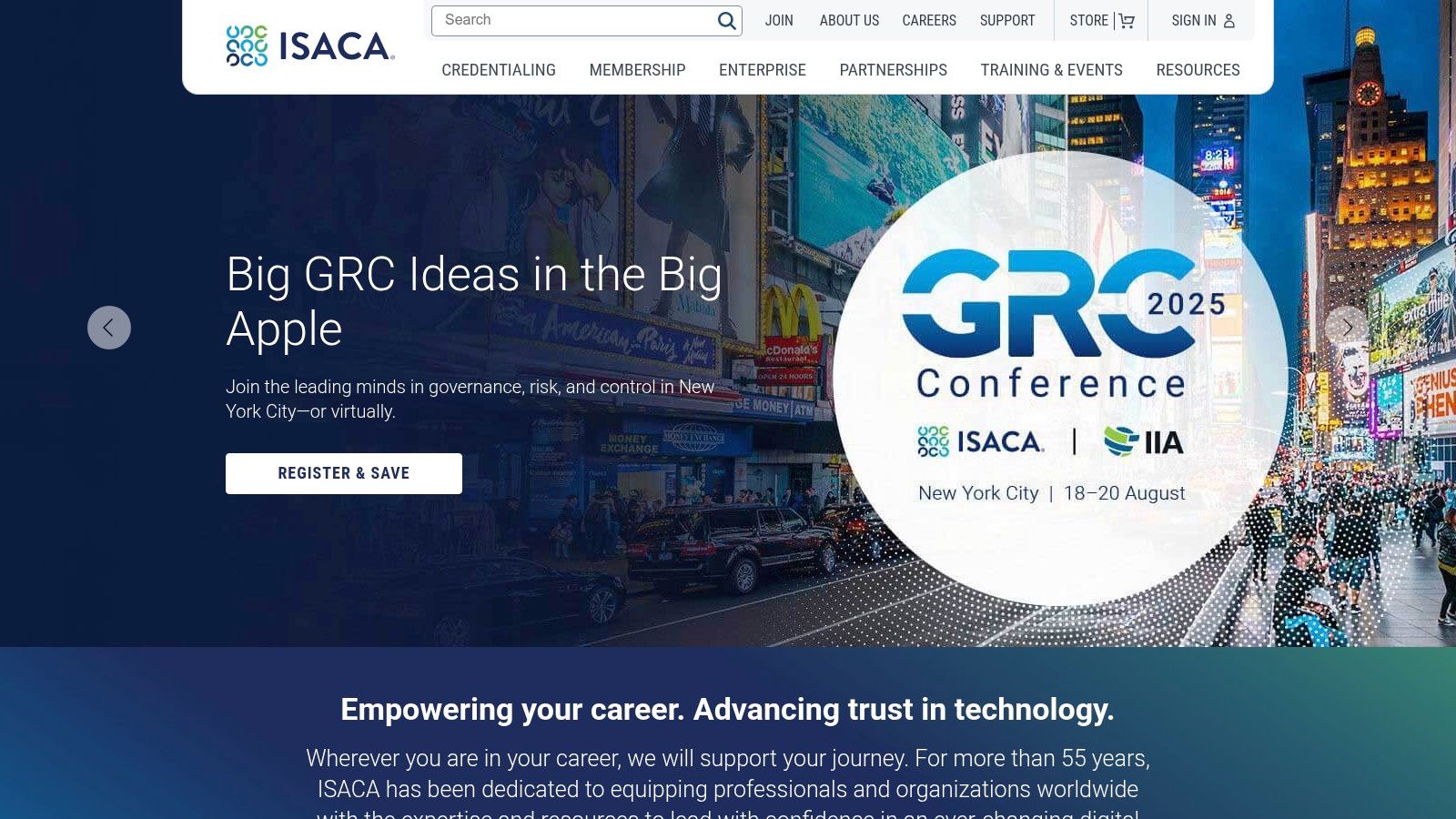
ISACA’s value lies in its focus on the strategic and managerial aspects of information systems, making it one of the best sources for certifications for remote jobs in leadership. Holding an ISACA certification signals a deep understanding of how to govern and secure an organization’s information assets, a critical skill for remote-first companies managing distributed digital infrastructure. The platform also provides a robust professional network and continuous learning resources to keep skills current.
Key Details & User Experience
The ISACA website serves as a comprehensive portal for members, offering exam registration, study materials, and access to a global community. While the interface is professional and data-rich, it can feel more corporate than modern learning platforms.
- Cost: Costs are significant. Exam registration fees range from $575 for members to $760 for non-members. Membership itself has an annual fee, and study materials are an additional expense.
- Time Commitment: Requires extensive self-study over several months, along with prerequisite years of professional experience to become fully certified.
- Pros: Greatly enhances credibility and earning potential in IT audit and security, high global demand for certified professionals, and access to excellent networking opportunities.
- Cons: Requires ongoing education and fees to maintain certification, and the total cost of exams, membership, and study materials can be high.
Website: https://www.isaca.org
12. Pluralsight
Pluralsight is a technology-focused learning platform squarely aimed at professionals in software development, IT operations, and cybersecurity. For individuals seeking the best certifications for remote jobs in these technical fields, Pluralsight provides an extensive library of high-quality courses authored by industry experts. It distinguishes itself with Skill IQ and Role IQ assessments, which allow you to measure your proficiency and follow curated learning paths to fill knowledge gaps, a crucial feature for targeting specific remote roles.
The platform is designed for continuous professional development, which aligns perfectly with the fast-evolving nature of tech. Its deep content library and hands-on learning approach help you stay relevant and competitive. The ability to download courses for offline viewing also provides the flexibility modern remote professionals need to learn anytime, anywhere.
Key Details & User Experience
Pluralsight’s interface is modern and geared towards goal-oriented learning, with clear paths and progress tracking. The video-based content is consistently high-quality, though the learning experience is largely self-directed with limited instructor interaction.
- Cost: Pluralsight operates on a subscription model. The Standard plan is around $29/month, while the Premium plan, which includes certification practice exams and projects, is about $45/month.
- Time Commitment: Varies based on the course or path. You can complete individual courses in a few hours or dedicate months to a comprehensive skill path.
- Pros: High-quality, expert-led content, regularly updated library, and strong assessment tools to guide learning.
- Cons: The subscription model can be costly, and there is limited direct interaction with instructors.
Website: https://www.pluralsight.com
Top 12 Remote Job Certification Platforms Comparison
| Platform | Core Features/Certifications | User Experience & Quality | Value Proposition | Target Audience | Price Point & Ratings |
|---|---|---|---|---|---|
| Coursera | Top university courses, free & paid certifications ✨ | High-quality, flexible ★★★★☆ | Reputable institutions, financial aid 💰 | Remote learners, career upskillers 👥 | Mixed free/paid, moderate cost 💰 |
| Udemy | Vast course library, lifetime access | Affordable, diverse ★★★☆☆ | Frequent discounts, self-paced 💰 | Budget learners, self-starters 👥 | Low cost with sales 💰 |
| LinkedIn Learning | Professional courses, LinkedIn certificate integration | Curated, mobile app ★★★★☆ | Personalized recommendations 🏆 | Professionals, continuous learners 👥 | Subscription model 💰 |
| edX | University-level, audit free/pay certificate | High quality, flexible ★★★★☆ | Academic rigor, financial aid available 💰 | Students, professionals 👥 | Varied cost, some pricey 💰 |
| Google Career Certificates | Quick programs, no experience needed | Job market recognized ★★★★☆ | Employer recognized, affordable 💰 | Career changers, beginners 👥 | Affordable single price 💰 |
| HubSpot Academy | Free marketing & sales courses | Practical & recognized ★★★★☆ | Completely free, industry recognized 🏆 | Marketing/sales professionals 👥 | Free 💰 |
| Scrum Alliance | Agile/Scrum certifications | Certified trainer-led ★★★★☆ | Globally recognized Agile creds 🏆 | Project managers, Agile pros 👥 | Expensive, renewal needed 💰 |
| CompTIA | Vendor-neutral IT certs (A+, Security+, etc.) | Widely accepted ★★★★☆ | Strong IT foundation, industry updated 🏆 | IT entry to advanced roles 👥 | Exam fees can be high 💰 |
| AWS Training & Certification | Cloud skills, multiple levels | Industry-demanded ★★★★☆ | Highly recognized, flexible learning paths 🏆 | Cloud professionals 👥 | Mid-high cost, challenging exams 💰 |
| Microsoft Learn | Role-based certs, free learning modules | Free resources, globally recognized ★★★★☆ | Microsoft tech expertise 🏆 | Microsoft tech users 👥 | Mostly free, exam fees extra 💰 |
| ISACA | IT governance/security certs (CISA, CISM) | Recognized, network access ★★★★☆ | High credibility, ongoing learning 🏆 | IT auditors, security pros 👥 | Membership & exam fees 💰 |
| Pluralsight | Tech courses, skill assessments, offline viewing | Expert-led, regularly updated ★★★★☆ | Flexible, tech-focused training 💰 | IT pros, developers, remote workers 👥 | Subscription-based 💰 |
From Certified to Hired: Your Next Steps to a Thriving Remote Career
Navigating the landscape of online learning to find the best certifications for remote jobs can feel overwhelming. As we’ve explored, platforms like Coursera and Google Career Certificates offer structured pathways into high-demand fields, while specialized providers such as AWS, CompTIA, and Scrum Alliance deliver the industry-specific credentials that remote employers actively seek. The key takeaway is that the “best” certification is not a one-size-fits-all answer; it’s the one that aligns directly with your career goals, existing skills, and the specific remote roles you are targeting.
Your journey doesn’t end once you receive your digital badge. Earning a credential is a powerful first step, but its true value is realized through strategic application. The most successful remote professionals know how to translate their certified skills into tangible value for a company.
Turning Your Certification into a Remote Job Offer
So, what’s next? It’s time to build a bridge from your new knowledge to your next remote opportunity. Here is a practical roadmap to follow:
- Showcase Your Achievement: Immediately update your professional profiles. Add your certification to the “Licenses & Certifications” section of your LinkedIn profile. Feature it prominently on your resume, ideally near the top in a “Skills” or “Certifications” section. If relevant, add project details to your portfolio.
- Articulate Your Value: Don’t just list the certification title. Be prepared to discuss the how and the why. In cover letters and interviews, connect your certification to the employer’s needs. For instance, instead of saying “I am a Certified ScrumMaster,” explain, “My ScrumMaster certification has given me a framework to lead agile teams, improve sprint planning, and ensure projects are delivered on time, which I see is a key requirement for this role.”
- Continue the Learning Loop: Technology and best practices evolve rapidly, especially in remote-first industries. Treat your new certification as a foundation, not a final destination. Leverage platforms like Pluralsight or LinkedIn Learning to stay current on emerging trends related to your credential.
Securing and Succeeding in Your New Role
Once your hard work pays off and you land an offer, the final details become critical. A clear understanding of expectations, responsibilities, and company policies is essential for a smooth start. Before you sign, carefully review all documentation, particularly your remote work agreement, as this document will define the terms of your employment, from work hours to equipment provisions. Being proactive at this stage sets the foundation for a successful and sustainable long-term remote career. By investing in the right skills and effectively demonstrating their value, you’re not just finding a job; you are building a future of professional growth and location independence.
Ready to put your new certifications to the test? Stop endlessly searching and start connecting with companies that value your skills. Remote First Jobs lists over 40,000 verified remote opportunities, allowing you to filter by the exact skills and technologies you’re now certified in. Find your next remote role on Remote First Jobs today!





